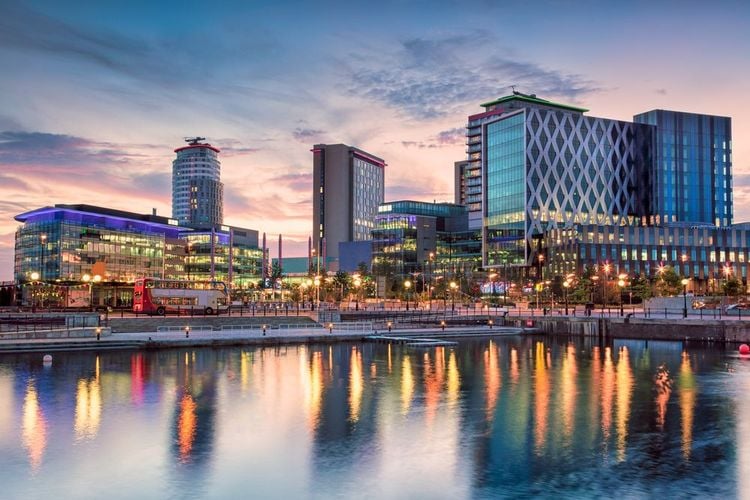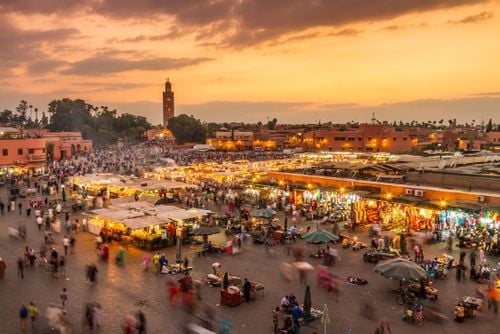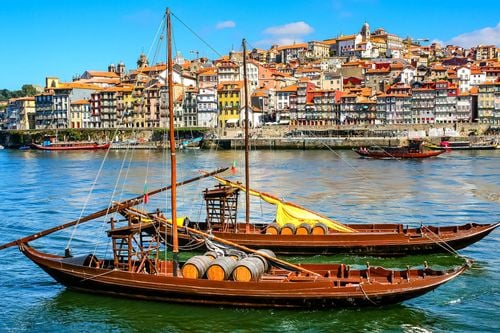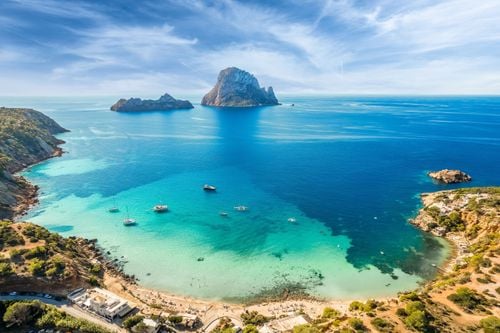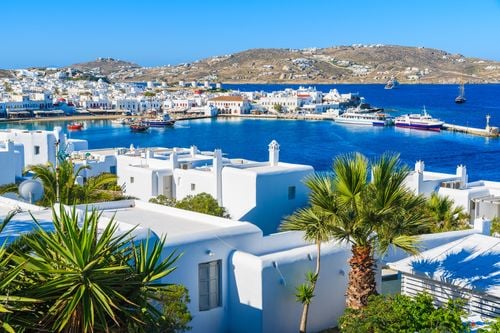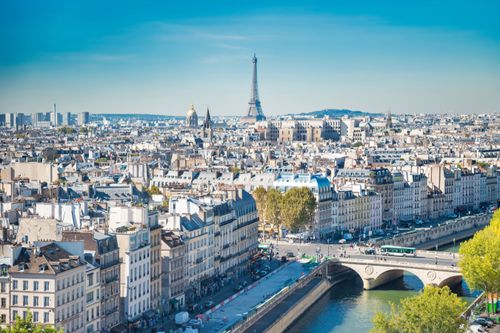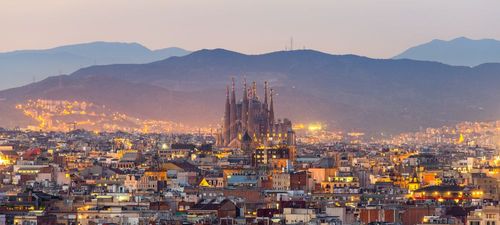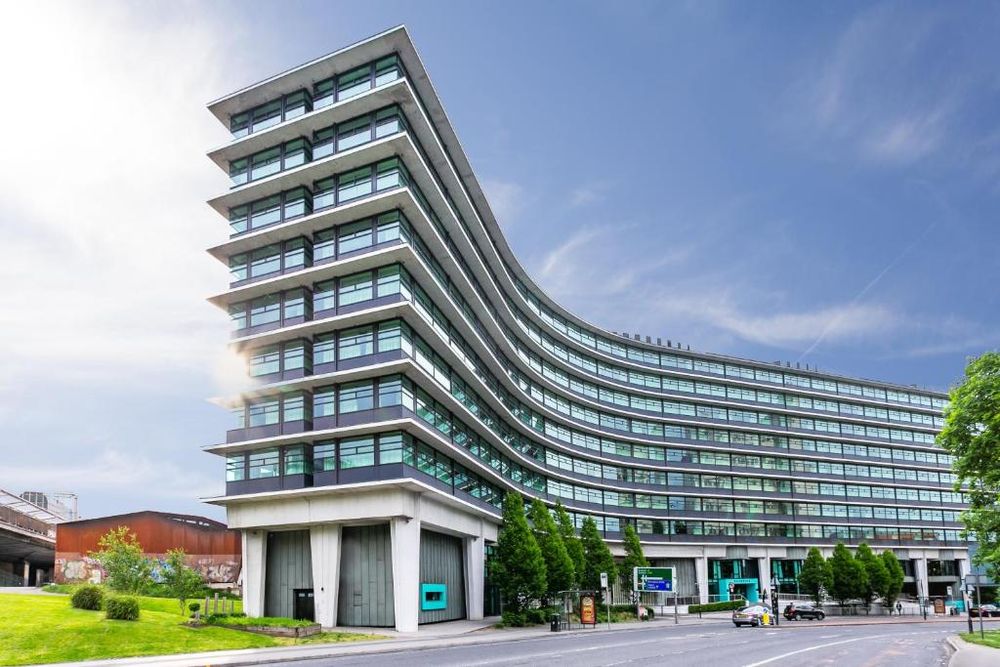 Manchester
Manchester
Few cities can boast as vibrant and influential a musical heritage as Manchester. Considered the cradle of indie music due to the emergence of countless bands that changed and defined genres between the 1970s and 1990s, including Sex Pistols, The Smiths, Joy Division, New Order, Stone Roses, Happy Mondays and Oasis, to name just a few. Thus, a trip to Manchester is akin to a musical pilgrimage for any music lover. Today, Manchester is still home to a constellation of independent music venues and record shops that strive to preserve the city's famous northern soul. On any given day, you'll find countless up-and-coming indie rock bands and storied Manchester favourites alike playing across the city, whether in looming arenas or cramped pub basements. So here's our guide to the best places to immerse yourself in the music capital of the world and let the music take you away!
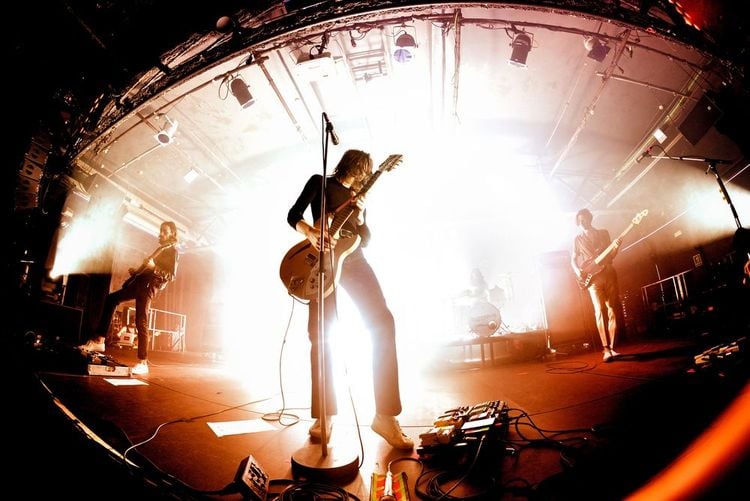
Blossoms, a popular indie rock band from Stockport in Manchester, playing a concert.
- © Christian Bertrand / ShutterstockThe Heavy Hitters
Manchester Arena may not be the best place to experience the intimate, do-it-yourself Manchester ethos and soul, but as the largest music venue in the UK (and the third-busiest in the world, behind London’s O2 Arena and New York’s Madison Square Garden!) it is certainly worth at least passing mention. Originally built as a sporting venue as part of Manchester’s unsuccessful bid to host the 2000 Summer Olympics (which was eventually won by Sydney, Australia), the Arena’s opening show was an on-ice performance by gold-medal ice skaters Jayne Torvill and Christopher Dean, attended by some 15,000 people, in 1995. Despite these athletic origins, the Manchester Arena has seemingly found its function as the music venue of choice for the world’s biggest acts when they grace the English north, with previous headliners including Take That, The Spice Girls, Britney Spears, Madonna, Whitney Houston, and Coldplay. Nonetheless, you can always expect a range of things to see at the arena, which hosts an average of 250 events annually, from concerts to comedy to sporting showcases to theatre and musicals! Manchester Arena is the place to go if you want big names and even bigger experiences.
Practical Information
- The Manchester Arena is currently operating under the name AO Arena for sponsorship reasons.
- Due to the superstar status of many acts who perform at Manchester Arena, tickets will often fetch in excess of £100. Make sure to always buy tickets directly from the site, as resale tickets may be refused by security. Due to the size of the venue, be prepared to be seated far away from the action if you purchase tickets as well.
- Manchester Arena is located very centrally within the Victoria Station complex. The nearest Metrolink tram stop is Victoria Station, which is serviced by lines from Rochdale, Bury, Altrincham, East Didsbury and the Airport. Shudehill bus station is only a five-minute walk from the Arena and Piccadilly bus station is just 10 minutes away. For help planning your journey, consult the Transport for Greater Manchester website here.
- To find out what’s on at the Manchester Arena, have a look at the venue’s official events page here.
- Manchester Arena is an Attitude is Everything GOLD standard venue in terms of accessibility, meaning its accessibility arrangements are of the highest standard. For more information, visit the Arena’s official website here.
The Apollo: Manchester’s Historic Art Deco Palace
Opened in 1938 in a stunning art deco style, the Apollo is arguably the most prestigious music venue in Manchester. Described by legendary Smiths guitarist Johnny Marr as his favourite music venue, the Apollo’s 3,500-person capacity also made it the largest music venue in the city until the Manchester Arena was erected in 1995. Originally constructed as a cinema and variety theatre, the Apollo served as a fire station during the Second World War before finally being converted into a concert space in the 1960s, quickly garnering acclaim for its beautiful interior design. It hosted a string of colossal names in the ‘70s and ‘80s from David Bowie to The Jacksons to Bruce Springsteen, making the venue into one of the most sought after in the country. Subsequent milestones have included an Oasis ten-year anniversary show in 2001, American pioneer Prince’s two-night show here in 2002, Smith’s frontman Morrissey’s 2009 fiftieth birthday show, and the use of the majestic venue to film scenes from the legendary Madchester film 24 Hour Party People and the Arctic Monkeys’ 2007 Live at the Apollo DVD set. Nowadays, the venue brings together the big-event feel of the Manchester Arena and that intoxicating Mancunian effect of other, much smaller venues, promising a night to remember every time it opens its art deco doors.
Practical information
- The Apollo is currently operating under the name O2 Apollo for sponsorship reasons.
- The Apollo is located in Ardwick, just outside central Manchester. It is a roughly 20-minute walk from Piccadilly Gardens. It isn’t immediately serviced by any trams, but is serviced by the number 192, 43, 44, and 51 bus lines from the city centre. The venue also provides parking, but at a fixed rate of £7 per vehicle, cash only. Consult the Transport for Greater Manchester website for more information.
- Tickets to performances at the Apollo normally cost between £30 and £60, or potentially more depending on the act. Check the website for prices and to see what’s on. Both seated and standing tickets are normally available.
- The Apollo is silver rated for accessibility by Attitude is Everything. For further information, visit the website.
 Manchester
Manchester
The Ritz: Manchester’s Oldest Music Venue (of Arctic Monkeys Fame)
The Ritz is Manchester’s oldest music venue, having first opened its doors in 1927 as a dance hall famous for its sprung dance floor. It has lived countless lives since, reopening as a tasteless nightclub in the 1960s infamous for its ‘grab-a-granny’ nights (so-called due to the mixed attendance of seniors reliving the Ritz’s dance hall glory days and students seeking fleeting dance floor romance) before serving as the spiritual precursor to The Hacienda as an originary hub for Manchester’s then-inchoate electronic and house scenes in the ‘70s, an emergent concert venue where The Smiths played their first show in the ‘80s, and the Grade II-listed staple in Manchester’s music scene it still stands as today, beloved by locals for its art deco interior and known more widely for its feature in the Arctic Monkeys’ seminal hit ‘From the Ritz to the Rubble’, in which frontman Alex Turner recounts an ill-fated pilgrimage to the nightlife landmark. As a 1,500-capacity venue, a concert at the Ritz is a much more intimate affair than one at the Manchester Arena, however it makes up for this in the electric atmosphere that seems almost built into its wall and is still large (and revered) enough to attract relatively big names. Headliners of the yesteryear include The Beatles, Stone Roses, The Smiths, John Cooper Clarke, and, of course, Arctic Monkeys, while more recent headliners have included everything from ‘80s art-rock outfit The Psychedelic Furs to Swedish cloud-rap collective Drain Gang to American funk-pop giant and Grammy Award-winner Lizzo. The venue also regularly hosts club nights, tribute acts, and comedy shows.
Practical Information
- The Ritz is currently operating under the name O2 Ritz for sponsorship reasons.
- The Ritz is located on Whitworth Street, a fifteen-minute walk from Piccadilly Gardens in the centre of Manchester. The nearest tram station is St. Peter’s Square, which is serviced by the pink and purple lines and is an eight-minute walk from the venue. Many buses also go via Oxford Road Station, one-minute from the venue. For more information, consult a travel guide here.
- Tickets to performances at the Ritz normally cost between £20 and £35. Check the website for prices and to see what’s on. Note that tickets are not sold as seated or standing, however seating is available on the balcony overlooking the standing area and stage.
- The Ritz is a generally accessible venue, however, there remain certain issues as it was built in the 1920s. . For more information, visit their website here.
Albert Hall: A Once-Forgotten Touch of Spirit
Albert Hall is one of Manchester’s most delightfully surreal and soulful music venues, occupying a former methodist chapel that was opened in 1910 before being abandoned and left to decay for forty decades between the 1960s and 1990s. Eventually ‘rediscovered’ in 1999 and transformed into a nightclub, its second life as one of England’s most magnetic music venues began in 2014, when acclaimed British singer-songwriter Anna Calvi inaugurated the venue on February 6th.
The current concert space is in what was once the Chapel Hall, the stage being located beneath the (still mint condition) grand organ and flanked on both sides by magnificent stained-glass windows and beautiful baroque plaster work. The building’s facade is equally spectacular, combining Manchester’s signature Gothic style with Baroque Revival tastes. Since its 2014 renaissance, the unique atmosphere found in the former church has attracted some of British music’s biggest names to the venue, among them Welsh rock heroes Manic Street Preachers, pioneering English pop star Sam Smith, and prodigious London rapper Little Simz. A trip to Albert Hall is one unlike any other.
Practical Information
- Albert Hall is located on Peter Street, a twelve-minute walk from Piccadilly Gardens in the centre of Manchester. The nearest Metrolink tram stop is Deansgate/Castlefield, serviced by the navy, purple, and red lines. Buses 103, 2, 263, 33, 34, 43, 44, and X50 also stop nearby. Visit the Albert Hall website for more information.
- Tickets at Albert Hall can cost between £15 and £40, depending on the artist and event. Tickets can be purchased directly from the website here.
- Albert Hall is a generally accessible venue. For more information, visit their website here.
The Locals’ Favourites
Band on the Wall: A Community Cornerstone in the Northern Quarter
Snugly located in Manchester’s vibrant Northern Quarter, Band on the Wall has a history that is perhaps unrivalled in the city’s music-venue matrix, despite having a maximum capacity of just 500 people. Originally built as the ‘George and Dragon’, the flagship pub of the local McKenna Brothers brewery, in 1862, the charming pub quickly became a people’s favourite in what was then an unglamorous working-class market district in a city industrialising too quickly for its own good and already with a reputation as a burning hearth of working-class political activity.
The pub picked up the affectionate nickname ‘Band on the Wall’ in the 1930s when, after several years of clandestine musical performances being hosted in the crowded pub, a stage was literally built half-way up the back wall. The venue’s specialty was jazz, a heritage it still holds proudly through its regular jazz events, however it rose to more national attention during the late 1970s as a favourite venue of Manchester’s emergent punk and post-punk bands, most notably the Buzzcocks, The Fall, and Joy Division. The venue has received attention more recently for its international outlook, always keeping a close ear to global sounds and the best of world music, having launched the We Face Forward initiative to spotlight exciting African musicians such as Gambia’s “King of Kora” Juliba Kuyateh. For over a century Band on the Wall has been at the forefront of musical innovation in the city, and this is a reputation that isn’t relenting any time soon.
Practical Information
- Band on the Wall is located on Swan Street between the Northern Quarter and Ancoats. It is a fifteen-minute walk from Piccadilly Gardens in the centre of Manchester. The nearest bus stop is New Cross, serviced by the 84 bus. Consult the Transport for Greater Manchester website for more information.
- Events at Band on the Wall normally cost between £5 and £20, however free music events are regularly run as well. Consult the What’s On page for more information. The space is also open as a regular pub and restaurant throughout the evening on weekdays and weekends. See the official opening schedule here.
- Band on the Wall has been awarded Gold Status for accessibility and inclusivity by the Attitude is Everything Charter. For more accessibility information, visit the website here.
The White Hotel: The New Face of Mancunian Music
White Hotel is an idiosyncratic music venue and one of the newest on the scene, having opened on New Year’s Eve in 2015. That said, it has been quick to transform the face of music in the city since. Somewhat drably located in a former garage in the shadow of Salford’s infamous Strangeways Prison (made famous by The Smiths’ 1987 album Strangeways, Here We Come), White Hotel has reclaimed the grimey, DIY punk ethos that defined Manchester’s music scene in the ‘70s and repurposed it with a contemporary, avant-garde flair, eschewing the city’s somewhat oversaturated indie scene and offering instead a cornucopia of experimental dance and techno soundscapes. The result is a quasi-cult that has formed around the venue who swear by its unmatchable atmosphere and will be found there on most weekends and even weekdays, despite (or perhaps because of) its less than glamorous setting. When you combine this die-hard fanbase with the cutting-edge sounds and boundary-pushing performances that have become synonymous with the venue, you get what is perhaps the most exciting music venue to come out the city since The Hacienda closed its doors in the ‘90s, as dancefloor legends Optimo themselves commented after playing here in 2019. For an induction into the White Hotel cult, should you decide yourself brave enough, some of its regular flagship events include ‘Meat Free’, known as “one of the wildest techno raves in the UK”, and ‘Tough Act’, a genre-bending electronic night with a focus on queer clientele and inclusivity. For more information on upcoming events, check The White Hotel’s Resident Advisor’s page.
Practical Information
- The White Hotel is located on Dickinson Street in Salford, which is an approximately twenty-five minute walk from Piccadilly Gardens in the centre of Manchester. The nearest bus station is Strangeways, which is serviced by the 59, X43 Witchway, and 135 buses. Consult the Transport for Greater Manchester website for more information.
- Tickets at White Hotel normally cost between £15 and £30, depending on the event. Make sure you research the acts performing before purchasing a ticket: White Hotel offers a diverse selection of performers and genres, some of whom will not be to everybody’s tastes, so make sure you know what you’re getting yourself in for before making the journey.
- White Hotel doesn’t have an official website to advertise accessibility arrangements, however has been praised for its inclusivity elsewhere and is known for its friendly and accommodating staff. It is encouraged that any specific enquiries are directed to the venue directly. Contact information can be found here.
YES: An Eclectic Selection
YES is another fresh face on the scene, having opened in 2018 in a former antiques auction house whose bare-brick building dates to 1912. Spread across four floors (which includes a gardened rooftop drinking terrace, perfect for the summer!), the space has quickly become a local staple and a favourite of students, serving as a hybrid cafe, restaurant, bar, club, and gig venue with delicious veggie and vegan street food at delightfully low prices. Music events will primarily take place in one of two rooms: the YES Basement, or the YES Pink Room. The YES Basement is, as the name suggests, located in the basement of the building and, with its maximum capacity of just 60 people, promises an unbeatably intimate night with some of the most exciting new names in music. The Pink Room, meanwhile, occupies the second floor of the building and gets its name from the pink lights that saturate the dancefloor. With its 250-person capacity, this is YES’s primary events space and hosts both live music events and its signature club nights, the most unmissable of which being the monthly Deptford Northern Soul Night that pays homage to the eponymous Northern soul subculture of Manchester’s 1960s and 1970s. Other regular events include ‘Chipped Polish’, which describes itself as a “queer alt punk/rock/pop club night”, and ‘Shock Horror’, which focuses on the darkwave and new wave genres of the late ‘70s. Meanwhile, previous musical guests include contemporary punk icons IDLES, local synthpop favourites Working Men’s Club, English avant-gardists Black Country, New Road, and legendary Zamrock outfit W.I.T.C.H. (‘We Intend to Cause Havoc).
Practical Information
- YES is located on Charles Street, an approximately twelve-minute walk from Piccadilly Gardens in the centre of Manchester. Several bus stops are close to the building, which is well serviced. The St. Peter’s Square tram stop is also a four-minute walk away. For more travel information, consult a travel guide.
- Club events at YES are regularly run for free, while live musical performances will cost you between £5 and £30, depending on the act. Check the What’s On page for more information.
- YES is also open from 12am every day as a street food restaurant and community cafe, serving delicious veggie and vegans bites for low prices. The kitchen normally closes around 12pm, when the building begins to transform into a club/music space.
- YES is a fully accessible building, with all floors being reachable by lift. Those with further questions are encouraged to contact the venue directly. Contact information can be found here.
Editor's Tip
- These are just a handful of the countless music venues to be found around Manchester, so don’t limit your search for some Mancunian music just to these. Other favourites include Deaf Institute, a regenerated former deaf institute building erected in 1878 where the likes of Kae Tempest and The 1975 cut their teeth; Gorilla, the sleek successor to the experimental Green Room located beneath Oxford Road’s railway arches; and SOUP, a hybrid restaurant and event space in the heart of the Northern Quarter.
- If you want to squeeze as many of these venues into your trip as possible, there are ‘city festivals’ arranged at various points throughout the year where one ticket will grant you entry into as many gigs as your heart desires in a number of venues across the city. The biggest of these is Neighbourhood Festival, held every October with a focus on indie rock, and Manchester Psych Fest, held every September with a focus on global psych and prog rock. Past headliners of the former include Blossoms, Sundara Karma, and Miles Kane, while the latter has been graced by the likes of Kurt Vile, Courtney Barnett, Stereolab, and Alti Gun.
